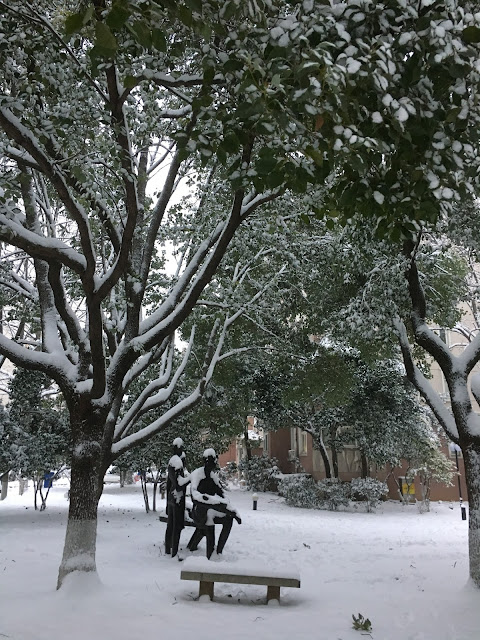It’s rare for city governments in China to run a thank-you letter on the front page of the Communist Party newspaper.
Monday’s edition of Nanjing Daily featured
a 1,360 character-long expression of gratitude to “city residents and friends,
as well as troops and government officers stationed in Nanjing” [广大市民朋友、驻宁部队官兵们].[1]
But while heavy snowfall in Nanjing is also rare
and effusive gratitude uncommon, the letter’s language is telling of the tendency for even forward-looking cities to fall back on the traditional.
It was Nanjing’s second snowstorm in three
days. Though nearly 30 cm of snow fell (the largest snowfall since 2008,
according to local news reports—which had been a record amount for some
decades), Nanjing citizens “who go out every morning were surprised to find
that the snow had ended, the roads are clear and the life is basically normal,”
the paper said.
The letter--a mix of celebration and self-congratulation--gives credit to five local players in Nanjing.
First, there’s the municipal government,
which Nanjing Daily said, “did
research in advance, carefully deployed resources, and organized efficiently
[through] precise scheduling and on-site supervision [现场督查] so that…units and departments at all levels and the general
public were able to generate widespread participation [广泛参与] and respond quickly.” In a very short time, Nanjing was able to
muster “an organized snow force of about 100 thousand people, including nearly
10000 soldiers, and about 4500 vehicles capable of clearing snow.”
Thanks go as well, the newspaper noted, to “the
8.3 million city residents for their selfless devotion [无私奉献].” They recognize, according to the letter, that as the city
slogan these days goes, “Nanjing is my home, civilization depends on everyone.”
[南京是我家,文明靠大家].
The third saviors of the city from the snows
were soldiers based in Nanjing—a city that, even
after Beijing’s restructuring, remains a major military base. Their
contribution, according to the newspaper, “provided ample evidence of the
people’s army’s ability to endure hardship [充分体现了人民子弟兵特别能吃苦].”
Then there are “the districts, the towns and
the communities that comprise the whole city…who organized cadres and the
masses into action… displaying the managerial ability of the all levels of
government and party organizations.”
Finally, the letter noted, thanks are due to
“the various administrative departments of the city-- sanitation, public
security, traffic police and management, construction, civil affairs,
agriculture, electricity, commerce, education, health, public transportation,
subway, airport, railway, news and other media and enterprises of all types --
for their unity, for fighting with all their might.”
Indeed, it’s this characterization—one of intensive
struggle against a foe—that’s particularly striking.
This was a public policy issue—one really of urban administration.
But Nanjing is instead portrayed in this letter as having confronted a “sudden attack
from a violent snowstorm [暴雪袭击].” Local
officials are described as “defending local territory” [守土], and having to “storm the heavily fortified position [攻坚战]” that was the snowfall. Officials and others here “fought
bravely over a number of days” [经过多日连续奋战], and
“with all of their might [顽强拼搏]
plowed snow and prevented frostbite by holding the line and winning a decisive
victory [扫雪防冻取得了决定性胜利].”
Casting social challenges as struggles is common here in China--part of the country's political culture of revolution and renewal through mass, often violent action and when reform takes a holiday. It may well be that using militarist language is the most
effective way to mobilize the political apparatus and the public, as well as placate Beijing[2]---which tends to use this sort of language far more often. Certainly an extraordinary job was done by all concerned in Nanjing in the past
few days; great credit should be spread far and wide. And as the letter notes,
coping with this challenge should help officials to “weed through the old to
bring forth the new [迈出新的更大步伐]”--that is, come up with novel ways to make better public policy.
Yet this was a blizzard, not a
battle. It might behoove some officials to make sure that they themselves know the difference, especially given Nanjing’s own particular history where invaders are concerned. Distinguishing between a snowstorm and a siege is surely a step on the right road.
[1] Yangtse Evening Post [扬子晚报] had the same
thank-you card today as well, though readers had to scan the QR code to
read the entire text, and the rest of the article was a forecast of frigid
temperatures into next week. Nanjing
Daily did run the complete text of the city government’s 2018 Work Report
in the Monday edition and that took up far more space. But that was at the
bottom of the front page, denoting somewhat less importance than the news carried above it.
[2] At the end of Nanjing’s thank-you letter,
there’s a nod to President Xi Jinping, urging readers to “unite more closely
around the Party Central Committee with Comrade Xi Jinping as the core” [让我们更加紧密地团结在以习近平同志为核心的党中央周围].




No comments:
Post a Comment